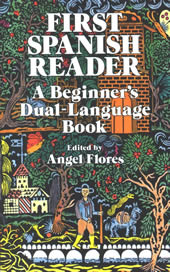Spanish
Jumping Right Into the Language
We're going to begin our study of the language by doing some simple exercises and translations. You should have some experience with the language.
Aquí se vende pescado fresco.
Preguntas
¿Por qué gasta don Pedro tanto dinero en un letrero.
Why did don Pedro spend so much on a sign?
Por qué le desea atrer la atención de todo el mundo en el barrio al abrir su nueva tienda del pescado.
Because he wants to attract the attention of everyone in his neighborhood to the opening of his new fish shop.
¿Qué palabras lleva el letrero?
What leters did the sign have on it?
En colores brillantes el letrero lleva las palabras siguientes: Aquí se vende pescado fresco.
In brilliant colors the sign said the following words: Here fresh fish is sold.
¿Por qué están de más las palabras se vende?
Why are the words sold here too much?
¿Por qué nadie va a suponer que en la tienda regalan el pescado.
Because no one is going to assume that the fish is given away for free.
¿Por qué sobra la palabra fresco?
Why did he get rid of the word fresh?
Por qué nadie va a dudar que le pescado no es fresco. ¿Cómo va usted a venderlo podrido?
Because no one is going to think that the fish is not fresh. Who is going to sell rotten fish?
¿Quién le hace quitar la última palabra?
Who told him to get rid of the last word?
Un amigo suyo, que vive en el campo.
A friend of his who lives in the city.
Ejercicio Escrito
¿Padre,Hijo, O Caballo?
Preguntas
¿A dónde ir el labrador, y para qué?
Where did the farmer decide to go, and for what?
El labrador y su hijo deciden a ir al pueblo para comprar unas cuantos cosas que necesitamos en el mercado.
The farmer and his son decide to go to the city to buy some things that are necessary in the market.
¿Quién le acompaña, y cuándo parten?
Who went with him and when did they leave?
El hijo del labrador le acompaña y ellos parten por la mañana muy temprano.
The farmer's son accompanied him and they left very early in the morning
¿Qué les critica el primer groupo de hombres?
What did the first group of men criticize?
El primer groupo de hombres critica que el caballo va a sin carga cuando ambos van a pie.
The first group of men criticize that the horse goes without cargo while they walk on foot.
¿Qué les critica el segundo groupo?
What did the next group criticize?
La critica del segundo group fue que el padre está loco pues, viejo y cansado, va a pie
mientras que su hijo, tan joven y robusto, va montado a caballo.
The criticism of the next group was that the father was crazy, because old and tired he walked on foot
while his son, young and healthy, was riding the horse.
Al fin ¿Cómo llegan al mercado?
At the end, how did they arrive at the market?
Ellos llegan al mercado con el caballo en sus hombros y claro que sí, muchos se lo critican.
They arrive at the market with the horse on their shoulders and of course many criticize them.
Ejercicio Escrito
Padre y su hijo parten por la mañana muy temprano.
Father and son leave early in the morning.
Hoy es el día del mercado y ellos vamanos a comprar unas cuantos cosas.
Today is market day and they go to buy a few things.
Un groupo de hombres que regresan del pueblo.
A group of men that are returning from the city.
Todos al mundo critica el padre.
Everyone criticizes the father.
El padre no tiene un opinión personal.
The father does not have an opinion for himself.
El Burro De Buridán
Preguntas
¿Quién es el dueño del burro?
Who is the owner of the donkey?
Un filósofo llamado Juan Buridán.
A philosopher named Juan Buridan.
¿Qué tiene para comer?
What does he have to eat?
El burro teniendo una gran cantidad de avena.
The donkey has a large quantity of oats.
¿Por qué no come?
Why doesn't he eat.
El burro no sabe que decidir: si comer o beber.
The donkey is not able to decide; Am I hungry or thirsty.
Ejercicio Escrito
Juan Buridan is a philosopher and owns a donkey.
Juan Buridán es un filósofo y teniendo un burro.
That is why we call the donkey Buridan's donkey.
Por eso llamando el burro de Buridán.
Juan's donkey never knows whether he is hungry or thirsty.
El burro de Juan nunca puede saber si tiene sed o hambre.
Many persons are like Buridan's donkey.
Muchas personas estan como el burro de Buridán.
They never have opinions of their own.
Ellos nunca tiene opiniónes personal.
